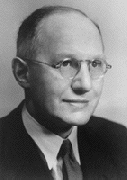|
|
||||||||||||||||||||||||
 |
Featured person
Recently added |
Professor Sir Graham Bull (1918 - 1987): |
||||||||||||||||||||||
Professor Sir Graham Bull was the first full-time Professor of Medicine at Queen’s University, Belfast, who brought with him energy, expertise and innovation in several areas, from flying ambulances, to medical statistics, to teaching and research methodology. Held in the highest regard as a clinician, a particular expertise was his interest in and knowledge of diseases of the kidney.
Graham McGregor Bull was born at Nyaunghla, Upper Burma, where his father. A medical practitioner, worked for an oil company. He grew up in South Africa, where he attended Diocesan College (also known as Bishops College), Rondebosch, Cape Province, and the University of Cape Town where he graduated MB, ChB with distinction in 1939. He worked in the department of medicine of the University of Cape Town at Groote Schuur Hospital from 1940 to 1946, also studying for an MD which he was awarded in 1947; the thesis was on postural proteinuria, a condition associated with kidney disease. His MD brought him a fellowship from the South African Council for Scientific and Industrial Research which enabled him to continue his research at the Postgraduate Medical School of London at Hammersmith. He was soon appointed to a lectureship at the School. His research there concerned the management of acute kidney failure, for which he devised a new treatment, which came to known as the “Bull Regime”; it was based on treatment using minimal fluid addition, gained Bull an international reputation as an expert in nephrology, and was credited with having saved countless lives throughout the world.
In 1952 he was appointed the first full time Professor of Medicine at Queen’s University, Belfast During his time at Queen’s he gained an extremely high reputation as an all-round clinician and teacher, by no means confined to nephrology. He published a paper on marking systems in medical examinations, arguing against essay-type exams and in favour of multiple choice-type exams. Eventually this became the standard form of examination in medicine, widely adopted. But besides this, he was generally recognised as having an encyclopaedic knowledge of the entire medical field, extending even to relatively neglected subjects such as psychiatry or geriatrics. He quickly earned the respect of all levels in the medical life of Belfast and Ulster, whether of senior colleagues, assistants, or students. His early experience in general practice gave him such innovative ideas as record linking systems, and he was very supportive of the embryonic flying ambulance service for the early treatment of cases of heart attacks (myocardial infarction). A further innovation stemmed from his insistence on the highest mathematical accuracy in both clinical and research work, and he was influential in establishing a department of medical statistics. He served as Chairman of the Northern Ireland Hospital Authority’s education and research committees where he played a leading role in the development of postgraduate education and the promotion of research over the whole field of medicine in the province. One notable move which he keenly supported was the establishment of a renal unit for Ulster. This had been suggested by John Megaw, a surgeon at Belfast City Hospital, and with Bull’s support the unit was established and came into operation in June 1959. Run from the beginning by Mollie McGeown, it became one of the most distinguished of its kind in the British Isles.
In 1966, by now a Fellow of the Royal College of Physicians (1954) he was appointed as Director of the new Medical Research Council’s clinical research centre at Northwick Park, where again he displayed his practical and innovative characteristics, for example by integrating a general hospital with a clinical research centre to have an establishment conceived as a single unit: this was the 800-bed Northwick Park Hospital. Though not without its critics, the institution he did so much to establish realised the MRC’s intention that research be lean towards conditions which, though common in the community which are so often were nevertheless neglected as subjects for research in traditional university environments, such as infectious diseases, nutrition and metabolic disorders. For his work he was knighted in 1976. He retired two years later. Bull was He was second vice-president of the Royal College of Physicians from 1978-79. He also served on the Medical Research Council’s Tropical Medicine Research Committee, the medical advisory committee of the Overseas Development Ministry, and the clinical investigation committee of the SEATO Cholera Research Laboratory. He became a member of the executive council of the Ciba Foundation, a charitable organisation, in 1970, and was a trustee from 1979 until his death.
He had married a fellow medical graduate of the University of Cape Town, Megan Patricia Jones, who herself had a distinguished career, as medical officer and later governor at Holloway women’s prison, from 1966-1982. Lady Bull’s work there was recognised by her being appointed OBE; a photograph of her is in the archive of the National Portrait Gallery.
| Born: | 30 January 1918 |
| Died: | 14 November 1987 |
| Richard Froggatt |
| Bibliography: Oxford Dictionary of National Biography; Richard Clarke: The Royal Victoria Hospital Belfast: A History (Belfast, Blackstaff Press, 1997); Debrett’s Handbook (1986); http://munksroll.rcplondon.ac.uk/Biography/ |


Home | Our Policies | Plaques | Browse | Search | Sponsors | Links | Help | Contact
Privacy & Disclaimer | Cookie Policy | Site Map | Website Design By K-Point
© 2024 Ulster History Circle









